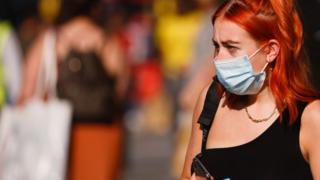 Image copyright
Getty Images
Image copyright
Getty Images
Face coverings are now required when visiting museums, galleries, cinemas and places of worship in England.
It has also been compulsory to wear them in shops since 24 July.
What are the face coverings rules in shops?
Face coverings must be worn in enclosed public spaces in England - this includes shops, supermarkets, shopping centres, banks, building societies and post offices. It extends to railway and bus stations and airports.
Customers must wear a face covering before entering any shop and keep it on until they leave.
Those who fail to do so could be fined up to £100, or £50 if they pay within 14 days. The rules will be enforced by the police, not shop workers, and only ''as a last resort''.
Shop workers do not have to wear coverings.
Will shops expect customers to wear masks?
Retailers differ over their approach. For example, Sainsbury's says it "won't be challenging customers without a mask'' since they may have a reason not to wear one, whereas Tesco says it has signs explaining the rules and also sells masks.
In Scotland, it's been a requirement to wear face coverings in shops since 10 July. Anyone not wearing one can be fined £60 (reduced to £30 if paid within 28 days) for a first offence. People with certain medical conditions or disabilities are exempt, along with children under five.
How about restaurants and takeaways?
In England, face coverings do not have to be worn where it would be ''impractical'' to do so.
That includes restaurants, pubs and gyms.
They must be worn in a shop or cafe when buying food and drink to take away, but can be removed if you sit down to eat and drink.
They are also optional in:
- Hairdressers and beauty salons
- Dentists and opticians
In Wales and Northern Ireland you do not currently have to wear a face covering in shops, or takeaways.
In Scotland, they are compulsory in shops and libraries. But the rules do not apply in takeaways, cafes, coffee shops, restaurants, pubs or in banks and building societies.
Who doesn't have to wear a face covering?
Some people do not have to wear a face covering. They include:
- Children under 11
- Those unable to put on or wear a face covering because of a physical or mental illness or disability
- People for whom wearing or removing a face covering will cause severe distress
- Anyone assisting someone who relies on lip reading to communicate
You can take off your mask if:
- You need to eat, drink, or take medication
- A police officer or other official asks you to or if shop staff need to verify your age
- You are entering a shop to avoid harm, if you do not have a mask on you
Children under three should not wear face masks as they could cause choking and suffocation, Public Health England says.
What are the face covering rules on public transport?
Since 15 June, anyone travelling by bus, train, ferry or plane in England must wear a face covering, if they are not exempted.
If it is "reasonably necessary" for you to eat or drink, you can remove the face covering to do so.
People can be refused travel if they don't follow the rules, and can be fined as a last resort.
Public transport excludes cruise ships, school transport, taxis and private hire vehicles.
In Scotland, it is compulsory to wear face coverings on all public transport.
This is also the case in Wales. These coverings should be three layers thick.
The wearing of face coverings on most buses, trains and ferries became mandatory in Northern Ireland on 10 July.
Where am I supposed to get a face covering?
The government has been careful to use the term "face covering" rather than "face mask" - with surgical masks kept for medical use.
The BBC has created a guide on how to make your own face covering. The government has issued its own advice too.
Do face coverings work?
World Health Organization (WHO) advice says non-medical face coverings should be worn in public where social distancing is not possible.
Coronavirus is spread when droplets are sprayed into the air when infected people talk, cough or sneeze. Those droplets can then fall on surfaces.
The WHO says there is also emerging evidence of airborne transmission of the virus, with tiny particles hanging in aerosol form in the air.
Homemade cloth face-coverings can help reduce the spread from people who are contagious but have no symptoms or are yet to develop symptoms.
Scientists in Singapore suggest the contagion risk is especially high in the 24-48 hours before an infected person is even aware they might have the disease.
Taking a face covering on and off can also risk contamination, the WHO says.